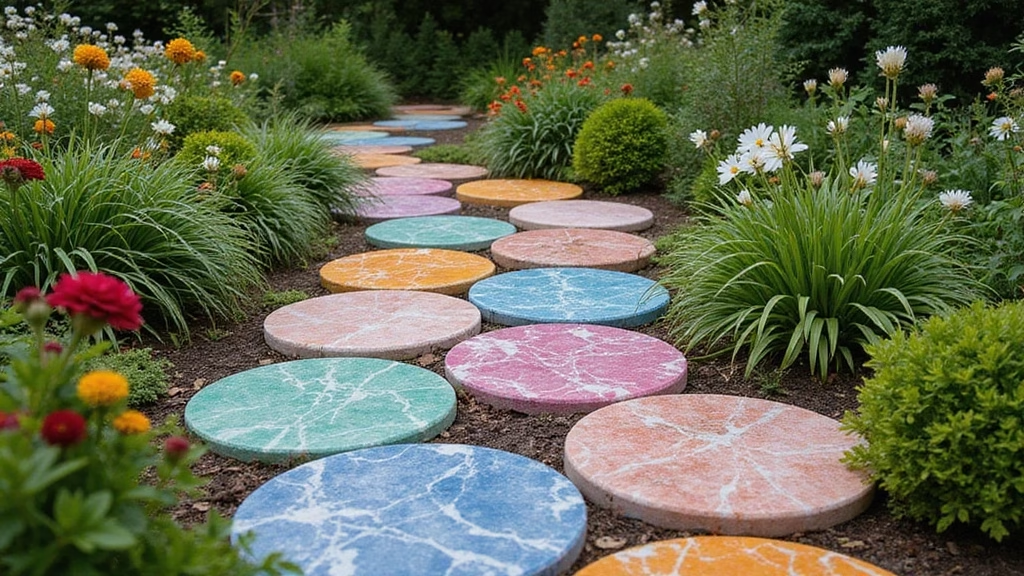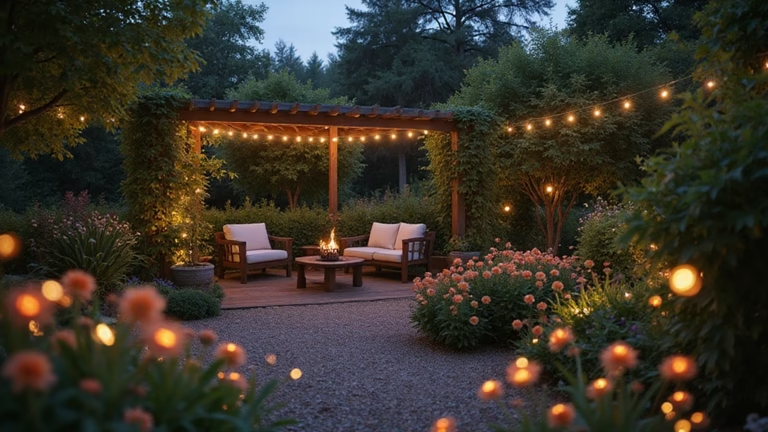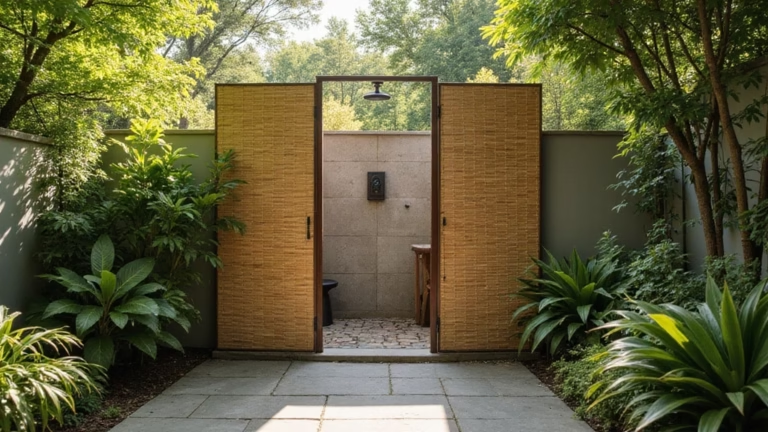Marbled concrete stepping stones merge art and function for elevated garden design. These durable elements create structured pathways while adding artistic flair to outdoor spaces. Beyond aesthetics, they provide practical navigation through gardens and yards. Discover sophisticated applications that enhance landscape architecture while expressing personal style through customizable concrete finishes.
1. Artisan Concrete Crafting Techniques

Master these professional marbling methods:
– Veining technique: Pour contrasting colors in parallel lines before combing
– Slurry application: Spray mineral pigments onto wet concrete for depth
– Form selection: Geometric molds for contemporary spaces, organic for cottage gardens
– Curing protocol: Maintain 70°F with 80% humidity for 72 hours
These approaches yield gallery-worthy results suitable for design-forward landscapes.
2. Sophisticated Color Harmonies

Create elevated palettes using these principles:
– Monochrome elegance: Three-tone grays with white veining
– Earth tone integration: Terracotta veins through slate bases
– Botanical complements: Sage green marbling alongside lavender plantings
– Modern contrast: Charcoal fields with brass flecks
Pro Tip: Sample pigments on concrete scraps before full commitment.
3. Tactile Surface Design

Enhance functionality through intentional texturing:
– Non-slip finishes: Exposed aggregate or broomed surfaces
– Contrast detailing: Polished veins against matte fields
– Border definition: Chamfered edges for clean lines
– Natural impressions: Subtle leaf fossils in corner accents
These treatments combine safety with sensory appeal.
4. Climate-Adaptive Formulations

Ensure longevity with climate-specific mixes:
– Freeze-resistant: 6% air entrainment for northern zones
– Heat-tolerant: Light-reflective quartz aggregates
– Humidity-stable: Polymer-modified concrete in coastal areas
– UV protection: Integral colorants rather than surface stains
Proper material selection prevents cracking and fading.
5. Architectural Pathway Design

Create intentional flow with these layout strategies:
– Axis definition: Straight alignments between architectural features
– Curvilinear guidance: Gentle arcs through planting beds
– Destination framing: Circular patterns at seating areas
– Proportional spacing: 24-30″ between centers for natural stride
These designs merge practicality with visual rhythm.
6. Sustainable Material Sourcing

Eco-conscious options without sacrificing quality:
– Recycled aggregate: 30-40% crushed glass or porcelain content
– Supplementary cement: Fly ash or slag replacements (20-30%)
– Local sourcing: Reduce transport emissions with regional materials
– Natural pigments: Iron oxides instead of synthetic dyes
These choices lower environmental impact by 25-40%.
7. Integrated Illumination Systems

Incorporate lighting with these refined approaches:
– Recessed LEDs: Waterproof fixtures set flush with surface
– Solar integration: Discrete panels on adjacent structures
– Warm spectrum: 2700K temperature for welcoming ambiance
– Zoned control: Separate circuits for entertaining vs security
This balances safety with atmospheric enhancement.
8. Cohesive Landscape Integration

Unify hardscaping with surrounding elements:
– Material echoing: Match stone colors to existing patios
– Planting repetition: Mirror bordering foliage textures
– Architectural alignment: Continue home’s line language
– Transition zones: Gradual sizing changes between areas
These techniques create intentional, polished environments.
9. Safety-Enhanced Applications

Prioritize safety without compromising design:
– Contrast borders: Light perimeter on dark stones
– Consistent elevation: Maximum 1/4″ height variation
– Aging-in-place: 24″ minimum width for stability
– Drainage integration: 1-2% slope to prevent pooling
These features ensure accessibility for all ages.
10. Seasonal Style Transitions

Refresh pathways with seasonal accents:
– Container framing: Flank with planters of seasonal blooms
– Minimalist decor: Weather-resistant sculptures or orbs
– Botanical highlights: Pruned branches in monochromatic vessels
– Lighting adjustments: Warmer tones in autumn, cooler in spring
These subtle changes honor seasons without overwhelming.
11. Natural Material Pairing

Complement concrete with organic elements:
– Wood integration: Ipe or teak border accents
– Stone pairing: Local fieldstone as incidental features
– Metallic touches: Bronze inlays for warmth
– Plant softening: Creeping thyme between stones
This approach creates balanced, textured compositions.
12. Mosaic Artistry Techniques

Elevate mosaics beyond craft projects:
– Material selection: Smalti glass or natural stone tesserae
– Restrained patterns: Geometric fragments vs pictorial
– Subtle integration: Single focal stone per pathway section
– Professional sealing: Impregnating sealers for longevity
This artisanal approach yields heirloom-quality pieces.
13. Permanent Surface Art Options

Incorporate lasting artistic elements:
– Oxide staining: Mineral-based translucent color washes
– Engraved details: Sandblasted botanical silhouettes
– Metallic leafing: 23k gold accents on veining
– Concrete inlays: Contrasting aggregate exposures
These permanent treatments withstand weather extremes.
14. Functional Herb Integration

Blend practicality with beauty:
– Border planting: Low-profile herbs along path edges
– Fragrant selections: Prostrate rosemary or woolly thyme
– Modular gaps: Strategic spacing for growth
– Accessible design: Knee-height maintenance points
This approach offers sensory delight and kitchen utility.
15. Personalized Design Elements

Incorporate meaningful details:
– Signature stones: Discrete corner monograms
– Celestial markers: Constellation patterns
– Cultural motifs: Abstract heritage symbols
– Commemorative dates: Roman numeral installations
These personal touches add significance without sentimentality.
Conclusion: Elevated Pathway Design

Marbled concrete stepping stones transcend functionality to become integral design elements. Their versatility supports both formal landscapes and naturalistic gardens while offering durable performance. By implementing these refined techniques, you create pathways that enhance property value while expressing individual aesthetic sensibilities. The result is outdoor artistry that evolves beautifully through seasons and years.








